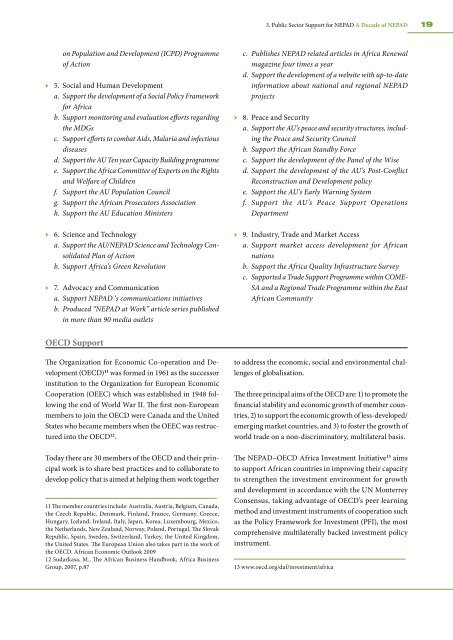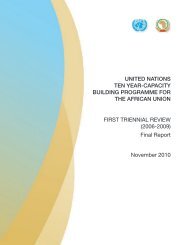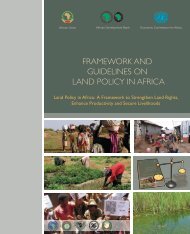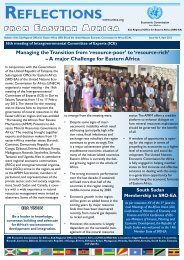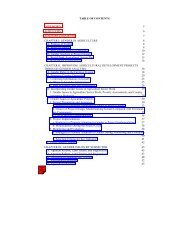A Decade of NEPAD - Economic Commission for Africa - uneca
A Decade of NEPAD - Economic Commission for Africa - uneca
A Decade of NEPAD - Economic Commission for Africa - uneca
Create successful ePaper yourself
Turn your PDF publications into a flip-book with our unique Google optimized e-Paper software.
on Population and Development (ICPD) Programme<br />
<strong>of</strong> Action<br />
ӹ 5. Social and Human Development<br />
a. Support the development <strong>of</strong> a Social Policy Framework<br />
<strong>for</strong> <strong>Africa</strong><br />
b. Support monitoring and evaluation ef<strong>for</strong>ts regarding<br />
the MDGs<br />
c. Support ef<strong>for</strong>ts to combat Aids, Malaria and infectious<br />
diseases<br />
d. Support the AU Ten year Capacity Building programme<br />
e. Support the <strong>Africa</strong> Committee <strong>of</strong> Experts on the Rights<br />
and Welfare <strong>of</strong> Children<br />
f. Support the AU Population Council<br />
g. Support the <strong>Africa</strong>n Prosecutors Association<br />
h. Support the AU Education Ministers<br />
ӹ 6. Science and Technology<br />
a. Support the AU/<strong>NEPAD</strong> Science and Technology Consolidated<br />
Plan <strong>of</strong> Action<br />
b. Support <strong>Africa</strong>’s Green Revolution<br />
ӹ 7. Advocacy and Communication<br />
a. Support <strong>NEPAD</strong> ‘s communications initiatives<br />
b. Produced “<strong>NEPAD</strong> at Work” article series published<br />
in more than 90 media outlets<br />
OECD Support<br />
The Organization <strong>for</strong> <strong>Economic</strong> Co-operation and Development<br />
(OECD) 11 was <strong>for</strong>med in 1961 as the successor<br />
institution to the Organization <strong>for</strong> European <strong>Economic</strong><br />
Cooperation (OEEC) which was established in 1948 following<br />
the end <strong>of</strong> World War II. The first non-European<br />
members to join the OECD were Canada and the United<br />
States who became members when the OEEC was restructured<br />
into the OECD 12 .<br />
Today there are 30 members <strong>of</strong> the OECD and their principal<br />
work is to share best practices and to collaborate to<br />
develop policy that is aimed at helping them work together<br />
11 The member countries include: Australia, Austria, Belgium, Canada,<br />
the Czech Republic, Denmark, Finland, France, Germany, Greece,<br />
Hungary, Iceland, Ireland, Italy, Japan, Korea, Luxembourg, Mexico,<br />
the Netherlands, New Zealand, Norway, Poland, Portugal, The Slovak<br />
Republic, Spain, Sweden, Switzerland, Turkey, the United Kingdom,<br />
the United States. The European Union also takes part in the work <strong>of</strong><br />
the OECD. <strong>Africa</strong>n <strong>Economic</strong> Outlook 2009<br />
12 Sudarkasa, M., The <strong>Africa</strong>n Business Handbook, <strong>Africa</strong> Business<br />
Group, 2007, p.87<br />
3. Public Sector Support <strong>for</strong> <strong>NEPAD</strong> A <strong>Decade</strong> <strong>of</strong> <strong>NEPAD</strong><br />
c. Publishes <strong>NEPAD</strong> related articles in <strong>Africa</strong> Renewal<br />
magazine four times a year<br />
d. Support the development <strong>of</strong> a website with up-to-date<br />
in<strong>for</strong>mation about national and regional <strong>NEPAD</strong><br />
projects<br />
ӹ 8. Peace and Security<br />
a. Support the AU’s peace and security structures, including<br />
the Peace and Security Council<br />
b. Support the <strong>Africa</strong>n Standby Force<br />
c. Support the development <strong>of</strong> the Panel <strong>of</strong> the Wise<br />
d. Support the development <strong>of</strong> the AU’s Post-Conflict<br />
Reconstruction and Development policy<br />
e. Support the AU’s Early Warning System<br />
f. Support the AU’s Peace Support Operations<br />
Department<br />
ӹ 9. Industry, Trade and Market Access<br />
a. Support market access development <strong>for</strong> <strong>Africa</strong>n<br />
nations<br />
b. Support the <strong>Africa</strong> Quality Infrastructure Survey<br />
c. Supported a Trade Support Programme within COME-<br />
SA and a Regional Trade Programme within the East<br />
<strong>Africa</strong>n Community<br />
to address the economic, social and environmental challenges<br />
<strong>of</strong> globalisation.<br />
The three principal aims <strong>of</strong> the OECD are: 1) to promote the<br />
financial stability and economic growth <strong>of</strong> member countries,<br />
2) to support the economic growth <strong>of</strong> less-developed/<br />
emerging market countries, and 3) to foster the growth <strong>of</strong><br />
world trade on a non-discriminatory, multilateral basis.<br />
The <strong>NEPAD</strong>–OECD <strong>Africa</strong> Investment Initiative 13 aims<br />
to support <strong>Africa</strong>n countries in improving their capacity<br />
to strengthen the investment environment <strong>for</strong> growth<br />
and development in accordance with the UN Monterrey<br />
Consensus, taking advantage <strong>of</strong> OECD’s peer learning<br />
method and investment instruments <strong>of</strong> cooperation such<br />
as the Policy Framework <strong>for</strong> Investment (PFI), the most<br />
comprehensive multilaterally backed investment policy<br />
instrument.<br />
13 www.oecd.org/daf/investment/africa<br />
19


